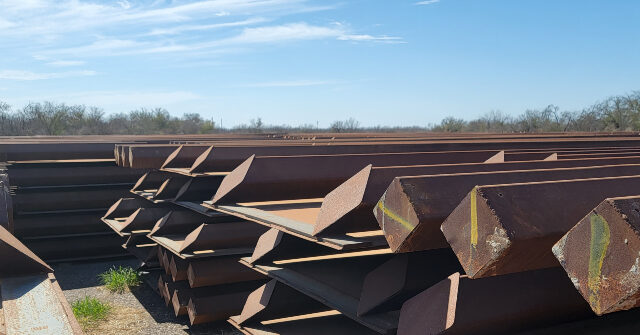In the wake of the Biden administration’s decision to auction off what seems to be surplus materials from unused border wall projects, Texas officials considered purchasing these materials to donate to the Trump administration. Lieutenant Governor Dan Patrick was particularly vocal about this plan, emphasizing during a Fox News appearance his intention to bid on the materials. Patrick’s comments were reported after daily news indicated that a significant amount of the surplus materials were being removed from border areas and sent to a government auction site.
However, subsequent evaluations revealed the materials were not in good condition, prompting skepticism from Texas officials. Patrick announced on social media that the Texas Facilities Commission had assessed the available materials and determined that much of it was “junk,” often damaged or covered in concrete and rust. In light of these findings, Texas officials recognized that while there were some panels that could be utilized, the cost of transporting them from Arizona to Texas outweighed any potential benefits. This assessment was echoed by U.S. Senator Joni Ernst, who remarked on the extensive nature of the damage, attributing it to actions such as unauthorized cutting by smugglers and weather-related damage.
Patrick argued that the poorly presented materials were likely part of what he termed a “Biden ruse,” aimed at appeasing far-left factions who oppose border security measures. He suggested that the Biden administration was deliberately attempting to undermine border security efforts associated with the Trump administration, even as the latter prepared to potentially return to power. On this premise, Patrick reassured Texas residents that if any panels of economic viability were sold, the state would be ready to procure them with a view to gifting them to Trump upon his possible inauguration.
The focus on border wall materials harks back to Governor Greg Abbott’s prior efforts in 2022, after the Biden administration halted border wall construction. Abbott had previously taken measures to purchase surplus materials they found lying unused, citing taxpayer investments in these structures. He emphasized this initiative as a means to address the gaps left by federal inaction on border security, which he attributed to the Biden administration’s policy choices. Abbott’s statements indicated a proactive approach in acquiring border wall materials despite federal restrictions on such efforts.
The attempts to procure wall materials reflect a broader ongoing political fracas surrounding immigration and border security, encapsulating the stark divide between Democratic and Republican strategies. Texas officials have frequently criticized the Biden administration’s stance as overly lenient, with assertions that a stronger border presence is essential for national security and public safety. This saga involving unused materials represents a microcosm of the political maneuvering involved in shaping immigration narratives and policies leading up to the next presidential election.
Ultimately, these ongoing discussions and events surrounding the potential sale and condition of border wall materials speak to the broader national conversation about immigration policy in America. The complexities of bipartisan politics manifest as state officials navigate the implications of federal decisions, striving to align their actions with the political landscape. The disposition of these materials may hold symbolic weight as much as practical value, influencing public perception ahead of critical electoral moments. Regardless of the outcome, the matter highlights the contentious environment surrounding border security measures in the U.S. and the implications of such actions on future policymaking endeavors.

